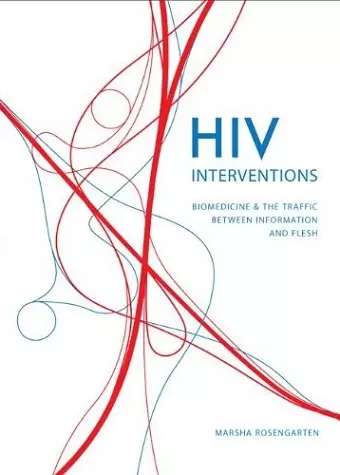HIV Interventions
Biomedicine and the Traffic between Information and Flesh
Format:Hardback
Publisher:University of Washington Press
Published:9th Oct '09
Currently unavailable, and unfortunately no date known when it will be back
This hardback is available in another edition too:
- Paperback£27.99(9780295989426)

In this ambitious work, Rosengarten brings the story of HIV/AIDS squarely into the twenty-first century. Even as the management of the epidemic becomes increasingly medicalized, HIV Interventions wisely demonstrates its profoundly social, political, and economic character. Rosengarten's mastery of diverse strands of social theory is matched by an abiding concern for ethics, agency, and human consequences. -- Steven Epstein, author of Impure Science: AIDS, Activism, and the Politics of Knowledge and Inclusion: The Politics of Difference in Medical Research A very complex and important book that bridges popular intellectual / cultural studies of HIV and feminist science / social studies in medicine. Both audiences will learn a great deal from this book, which calls for a rethinking of how technologies, especially treatments, have reframed the body in general, and of those who have HIV in particular. -- Cindy Patton, Simon Fraser University This book is effectively the first in ten years to engage critically with HIV science and technology, and hence is long overdue. -- Catherine Waldby, author of Tissue Economies: Blood, Organs, and Cell Lines in Late Capitalism In this remarkable and timely work, Marsha Rosengarten makes the compelling argument that to approach the issue of HIV intervention as if information and flesh are distinct--as if the task of intervention is simply to convince fleshy bodies to behave according to the information--constrains our ability to think the processes and relationships at stake. Writing with admirable concision and clarity, she transfigures a theoretical terrain too long encumbered by such restrictive understandings in order to provide an alternative, nuanced perspective on how the HIV assemblage--the virus, the diagnostic apparatuses, antiretroviral treatments, pharmaceutical trials and interests, human embodiment and wider responses to HIV--consists of a myriad of processes that quite literally inform matter. Well beyond debates on 'performativity v matter' and 'technological v organic', this erudite work contains the best arguments I know for the political importance of thinking through the implications of such 'informed matter'. -- Vikki Bell, Professor of Sociology, Goldsmiths, University of London
Seeks to understand the relationship between HIV, medical technologies, and ideas about the body. This book is suitable for those who are engaged in questions of the social and ethical dimensions of biomedicine, biotechnology, and genomics.
Winner of the Sociology of Health and Illness Book Prize
HIV has changed in the presence of recent biomedical technologies. In particular, the development of anti-retroviral therapies (ARVs) for the treatment of HIV was a significant landmark in the history of the disease. Treatment with ARV drug regimens, which began in 1996, has enabled many thousands to live with the human immunodeficiency virus without progressing to AIDS. Yet ARVs have also been fraught with problems of regimen compliance, viral resistance, and iatrogenic disease. Besides intensifying the technological and ethical complexities of medicine, the drugs have also affected conceptions of risk and risk practices, in turn presenting new challenges for prevention.
In order to devise safer, more effective forms of treatment, prevention, and possibly cure, Marsha Rosengarten asserts, it is essential to understand the relationship between HIV, medical technologies, and ideas about the body. HIV is an entity that constitutes and is constituted by complex material and informational environments. Recognition of this two-way traffic between the medical science of HIV and the expression of HIV in individuals and societies provides a novel basis for devising new or supplementary modes of thinking about and intervening in the epidemic.
Through such diverse materials as drug advertisements, pill formulations, scientific articles, clinical trials, diagnostic test results, and viral imaging as well as interviews with those living and working with HIV, Rosengarten provides numerous demonstrations of how the entities comprising the HIV epidemic - bodies, viral resistance, diagnostic results, safe sex - are forged through dynamic relations.
These various phenomena challenge existing prevention models and raise social and ethical concerns about the impact of additional technologies such as HIV pre- and post-exposure prophylaxis and the promise of vaccines and microbicides.
HIV Interventions is relevant to those engaged in questions of the social and ethical dimensions of biomedicine, biotechnology, and genomics. Further, the specific focus of the project offers HIV practitioners - in the sciences and social sciences, in clinical research, clinical practice, social research, policy development and prevention education -...
"This concise, provocative book explains its terms and makes it significant theoretical contributions lightly, such that despite the complex science and advanced theoretical debates involved, it would be useful for many university courses."
-- Vicki Bell * Sociology of Health and Illness *"Sociologist Rosengarten takes on complex materials relating to HIV interventions, especially how HIV preventions and treatments are conceived, interpreted, and practiced."
* ChoiISBN: 9780295989594
Dimensions: unknown
Weight: 363g
148 pages